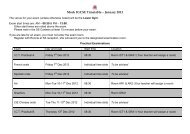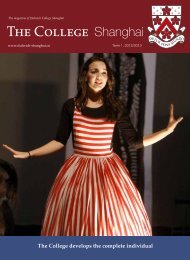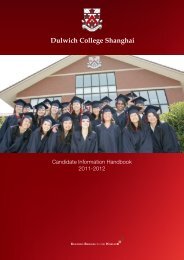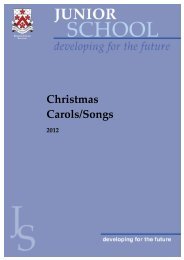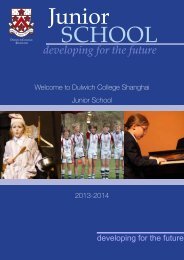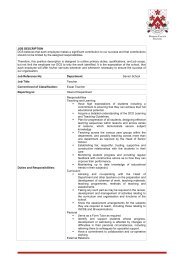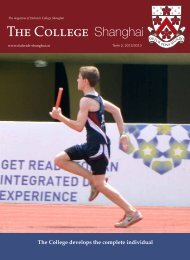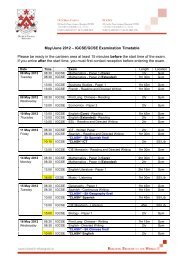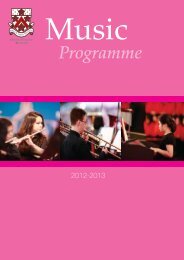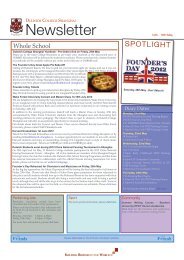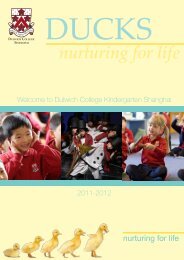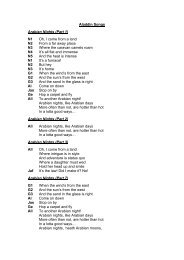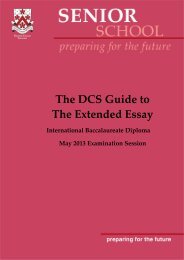preparing for the world - Dulwich College Shanghai
preparing for the world - Dulwich College Shanghai
preparing for the world - Dulwich College Shanghai
- No tags were found...
You also want an ePaper? Increase the reach of your titles
YUMPU automatically turns print PDFs into web optimized ePapers that Google loves.
<strong>preparing</strong> <strong>for</strong> <strong>the</strong> <strong>world</strong>Homework tasks will have clear objective(s), directly linked to <strong>the</strong> course being undertaken. Sample tasks:Investigations Interviews Simple experiments Essay writingResearch Public library visit Drafting Report writingReading Designing Revision Making a modelDrawing Word processing Desktop publishing ProjectsEffective preparation Learning vocabulary Preparing a Presentation Collating and organising notesPractising questions Rein<strong>for</strong>cing work Watching a television programme Planning an investigationComposing music or poetry Solving problems Practising skills Answering questionsInterviews Group or Pair Assignments Engaging in an online activity Role play preparationParents and Guardians should, as far as possible:• Provide a reasonably peaceful, suitable place in which students can do <strong>the</strong>ir homework• Support <strong>the</strong> school in valuing homework• Use <strong>the</strong> Student Diary to see that deadlines are being met• Encourage students to work independently• Test learning (e.g. vocabulary) or listen to children read what <strong>the</strong>y have writtenHomework support• The Library is open Monday to Friday until 4.30pm• Homework and coursework help sessions are organised by various departments• Handwriting, spelling and homework clubs are organised by <strong>the</strong> EAL Department <strong>for</strong> selected studentsIf parents or guardians feel <strong>the</strong>re is a problem with <strong>the</strong> amount or difficulty of homework <strong>the</strong>y should contact <strong>the</strong> FormTutorHomework SanctionsIf a student cannot complete homework or an assignment because of illness or o<strong>the</strong>r extenuating circumstances, <strong>the</strong>parent should write a note to <strong>the</strong> subject teacher in <strong>the</strong> Student Diary, or send an e-mail, requesting extra time to complete<strong>the</strong> work. The subject teacher will <strong>the</strong>n agree an appropriate extension. If no note is received and a student fails to turnin an assignment, a referral <strong>for</strong>m will be completed as per <strong>the</strong> Behaviour Management Policy.A student’s consistent failure to complete homework assignments will also be reflected on <strong>the</strong>ir end of term report. Ifa student consistently experiences difficulty in completing assignments, <strong>the</strong> parents and Form Tutor or subject teachershould meet to review <strong>the</strong> situation. If <strong>the</strong> situation continues <strong>the</strong>n <strong>the</strong> parents will be asked to meet with <strong>the</strong> relevantDeputy Head of Senior School.Homework DiaryAll new students in <strong>the</strong> Senior School are given a homework diary at <strong>the</strong> beginning of each new school year. Allreturning students will receive new inserts <strong>for</strong> <strong>the</strong>ir diary.It is <strong>the</strong> students responsibility to ensure that it is completed <strong>for</strong> every homework task given by teachers and that if notask is set this is also clearly recorded.Should <strong>the</strong> diary be lost it is up to <strong>the</strong> student to purchase a replacement from <strong>the</strong>ir Form Tutor.Additional Educational Needs in Senior SchoolThe Additional Educational Needs (AEN) faculty in Senior School consists of both Learning Support and English as anAdditional Language (EAL) departments. AEN teachers support students who have been identified as having specificlearning difficulties and students <strong>for</strong> whom English is not <strong>the</strong>ir native language. Levels of support are based around <strong>the</strong>students’ individual needs in small learning environments.Learning Support:The senior school offers individual programmes <strong>for</strong> students with diagnosed, mild learning difficulties/SpecialEducational Needs (SEN), and provision <strong>for</strong> students who may require learning support at some point during <strong>the</strong>iracademic studies.All provision is aimed at students’ specific learning needs and is cross curricular whenever possible. Students’ supportis often through individual or small group withdrawal systems, but is also carried out through supporting teachers bycreating effective learning strategies to remove barriers to learning in mainstream classes.English as an Additional Language (EAL):The Senior School offers an extensive EAL programme. This programme in most cases sees <strong>the</strong> student withdrawnfrom <strong>the</strong>ir Modern Foreign Language class (French or Spanish) or through a differentiated English Curriculum, taughtin small groups to allow students to access skills that mirror <strong>the</strong> content of <strong>the</strong> curriculum. During this withdrawal,<strong>the</strong> students work in small groups with a teacher on a dedicated EAL program. Withdrawal from Modern ForeignLanguages means that students are still with <strong>the</strong>ir normal classes <strong>for</strong> core subjects. Moreover, it alleviates <strong>the</strong> need <strong>for</strong>students to master ano<strong>the</strong>r additional language.The skills that <strong>the</strong> students acquire in <strong>the</strong>se courses will assist <strong>the</strong>m in <strong>the</strong>ir mainstream classes. Our aim is that EALstudents throughout years 7 to 9 will gain sufficient proficiency from <strong>the</strong>se courses to undertake mainstream IGCSEexaminations in English. If this is not <strong>the</strong> case <strong>the</strong> Senior School offers English as a Second Language (ESL) at this level.English as a Second language (ESL):The ESL syllabus is designed to access <strong>the</strong> students’ ability to use English as a medium of practical communication, andis aimed at students <strong>for</strong> whom English is not a first language or mo<strong>the</strong>r tongue.The aims of this course are to:• Develop <strong>the</strong> ability to use English effectively <strong>for</strong> <strong>the</strong> purpose of practical communication• Form a sound base <strong>for</strong> <strong>the</strong> skills required <strong>for</strong> fur<strong>the</strong>r study or employment using English as <strong>the</strong> medium• Develop an awareness of <strong>the</strong> nature of language and language-learning skills, along with skills of a moregeneral application• Promote students’ personal developmentStudents will take examinations in reading and writing as well speaking orals and listening tests.TechnologyWe believe that a 1-1 laptop environment will best prepare our students <strong>for</strong> <strong>the</strong> challenges of living and working in<strong>the</strong> 21st Century. Our primary goal is not to improve students’ technology skills but ra<strong>the</strong>r to engage students inmeaningful work and encourage <strong>the</strong>m to take charge of <strong>the</strong>ir own learning. Recognising that knowledge creation ra<strong>the</strong>rthan knowledge acceptance will lead to lifelong learning, we believe that, under <strong>the</strong> right conditions, technology canaccelerate, enrich, and deepen basic skills; motivate and engage students in learning; increase <strong>the</strong> economic viability oftomorrow’s workers; and connect our students to <strong>the</strong> real <strong>world</strong>.Fur<strong>the</strong>rmore, we seek to develop a one-to-one programme that will facilitate <strong>the</strong> kinds of learning, thinking, and analysisthat today’s <strong>world</strong> demands, helping to produce students whoare learning leaders and not learning followers.To this end technology is embedded in <strong>the</strong> curriculum ra<strong>the</strong>rthan being taught discretely.Please note: Currently parents are required to purchase alaptop on entry to <strong>the</strong> Senior School. The procedures <strong>for</strong> doingthis are currently under review and new guidelines and detailswill be published shortly.25 26



